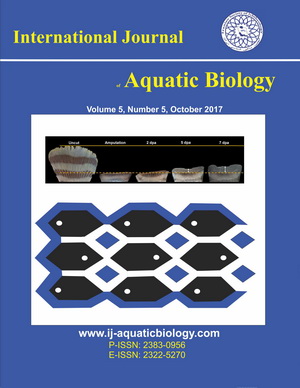Effects of florfenicol on skin mucus immune parameters and immune related genes expression in zebrafish (Danio rerio)
Downloads
Florfenicol (FF) is a common, inexpensive antibiotic with relatively low toxicity. The present study investigates the possible effects of Florfenicol on cutaneous mucus immune parameters and immune related genes expression in Danio rerio. After two weeks adaptation, fish were stocked in experimental units at density of 20 fish per aquaria and fed with experimental diets containing 0, 10, 30 and 50 mg/kg FF per for 11 days. Evaluation of immune parameters at the end of trial showed that the control group had a significantly lower level of lysozyme activity when compared with those treated with antibiotic. However, the skin mucus total immunoglobulins level of fish fed diets containing antibiotics did not show any significant difference compared to the control group. The highest expression level of TNF-α, IL1β and lysozyme was observed in fish treated with 10 mg/kg FF while the lowest expression was noticed in those fish treated with 30 and 50 mg/kg FF. The present results indicate the relatively positive effects of this antibiotic on the immune system of zebrafish, and it seems that the appropriate dosage of the drug can serve as an immunostimulant for zebrafish.
Downloads
Anadon A., Martinez M. A., Martinez M., Rios, A., Caballero V., Ares I., Martinez-Larranaga R. M. (2008). Plasma and tissue depletion of florfenicol and florfenicol-amine in chickens. Journal of Agricultural and Food Chemistry, 56: 11049-11056.
Anbarasu K., Chandran M.R., (2001). Effect of ascorbic acid on the immune response of the catfish, Mystus gulio (Hamilton), to different bacterins of Aeromonas hydrophila. Fish and Shellfish Immunology, 11(4): 347-355.
Awad E., Mitchell W.J., Austin B. (2011). Effect of dietary supplements on cytokine gene expression in rainbow trout, Oncorhynchus mykiss (Walbaum). Journal of Fish Diseases, 34: 629-634.
Ayse E., Burak D. (2014). The Effects of florfenicol on the values of serum tumor necrosis factor- and other biochemical markers in lipopolysaccharide-induced endotoxemia in brown trout. Mediators of Inflammation, ID 464373.
Bjorklund H., Bylund G. (1990). Temperature-related absorption and excretion of oxytetracycline in rainbow trout (Salmo gairdneri R.). Aquaculture, 84: 363–372,
Caipang C.M.A., Lazado C.C., Brinchmann M.F., Berg I., Kiron V. (2009). In vivo modulation of immune response and antioxidant defense in Atlantic cod Gadus morhua following oral administration of oxolonic acid and florfenicol. Comparative Biochemistry and Physiology, 150: 459-464.
Catry B., Duchateau L., Van De Ven J., Laevens H., Opsomer G., Haesebrouck F., De Kruif A. (2008). Efficacy of metaphylactic florfenicol therapy during natural outbreaks of bovine respiratory disease. Journal of Veterinary Pharmacology and Therapeutics, 31: 479-487.
Dehghan F., Vazirzadeh A., Soltanian S., Karami A., Akhlaghi M. (2016). Mortality rate and immune responses of rainbow trout (Oncorhynchus mykiss) infected with Yersinia ruckeri subsequent to feeding on diet supplemented with Ducrosia anethifolia essential oil. International Journal of Aquatic Biology, 4(5): 340-344.
Driever W., Solnica-Krezel L., Schier A.F., Neuhauss S.C., Malick J., Stemple D.L. (1996). A genetic screen for mutations affecting embryogenesis in zebrafish. Development, 123: 37-46.
Ellis A.E. (2001). Innate host defense mechanisms of fish against viruses and bacteria. Developmental and Comparative Immunology, 25(8): 827-839.
Er A., Yazar E., Uney K., Elmas M., Altan F., Cetin G. (2010). Effects of tylosin on serum cytokine levels in healthy and lipopolysaccharide-treated mice. Acta Veterinaria Hungarica, 58(1): 75-81.
Er A., Yazar E. (2012). Effects of tylosin, tilmicosin and tulathromycin on inflammatory mediators in bronchoalveolar lavage fluid of lipopolysaccharide-induced lung injury. Acta Veterinaria Hungarica, 60(4):465-76.
Gioacchini G., Maradonna F., Lombardo F., Bizzaro D., Olivotto I., Carnevali O. (2010). Increase of fecundity by probiotic administration in zebrafish (Danio rerio). Reproduction, 140: 953-959.
Gruss H.J. (1996). Molecular, structural, and biological characteristics of the tumor necrosis factor ligand superfamily. International Journal of Clinical and Laboratory Research, 26(3): 143-159.
Guan S., Song Y., Gao W., Wang D., Zhang Z., Lu J., Deng X. (2011). Immunosuppressive activity of florfenicol on the immune responses in mice. Immunological Investigations, 40: 356-366.
Haffter P., Granato M., Brand M., Mullins M.S., Hammerschmidt M., Kane D.A. (1996). The identification of genes with unique and essential function in the development of the zebrafish, Danio rerio. Development, 123:1-36.
He S., Zhou Z., Meng K., Zhao H., Yao B., Ringí˜ E., Yoon I. (2011). Effects of dietary antibiotic growth promoter and Saccharomyces cerevisiae fermentation product on production, intestinal bacterial community, and nonspecific immunity of hybrid tilapia (Oreochromis niloticus female · Oreochromis aureus male). Jounnal of Animal Science, 89: 84-92.
Holloway Jr. H.L., Shoemaker C.A., Ottinger C.A. (1993). Serum lysozyme levels in paddlefish and walleye. Journal of Aquatic Animal Health, 5: 324-326.
Hu D., Zhang T., Zhang Z., Wang G., Wang F., Qu Y., Niu Y., Liu S. (2014). Toxicity to the hematopoietic and lymphoid organs of piglets treated with a therapeutic dose of florfenicol. Veterinary Immunology and Immunopathology, 162: 122-131.
Itami T., Takehara A., Nagano Y., Suetsuna K., Mitsutani A., Takesue K., Takahashi Y. (1992). Purification and characterization of lysozyme from ayu skin mucus. Nippon Suisan Gakkaishi, 58: 1937-1944.
Khajeali Y., Kheiri F., Rahimian Y., Faghani M., Namjo A. (2012). Effect of use different levels of caraway (Carum carvi) powder on performance, some blood parameters and intestinal morphology on broiler chickens. World Applied Science Journal, 19: 1202-1207.
Li L., Yang Y., Hou X., Gu D., Ba H., Abdulla R., Aisa H.A. (2013). Bioassay-guided separation and purification of water-soluble antioxidants from Carthamus tinctorius L. by combination of chromatographic techniques. Separation and Purification Technology, 104: 200-207.
Lunden T., Miettinen S., Lonnstrom L.G., Lilius E.M., Bylund G. (1999). Effect of florfenicol on the immune response of rainbow trout (Oncorhynchus mykiss). Veterinary Immunology and Immunopathology, 67: 317-325.
Mahghani F., Gharaei A., Ghaffari M., Akrami R. (2014). Dietary synbiotic improves the growth performance, survival and innate immune response of Gibel carp (Carassius auratus gibelio) juveniles. International Journal of Aquatic Biology, 2(2): 99-104.
Makvand H., Khodadadi M., Keyvanshokooh S., Mohammadi Makvandi Z. (2011). Effect of salinity stress on cortisol and glucose levels of grass carp (Ctenopharyngodon idella). Aquaculture and Fisheries, 2(8): 77-84. (In Persian)
Masahiro S. (1999). Current research status of fish immunostimulants. Aquaculture, 172: 63-92.
Miandare H.K., Farahmand H., Akbarzadeh A., Ramezanpour S., Kaiya H., Miyazato M., Rytkönen K.T., Nikinmaa M. (2013). Developmental transcription of genes putatively associated with growth in two sturgeon species of different growth rate. General and Comparative Endocrinology, 182: 41-47.
Park B.K., Lim J.H., Kim M.S., Hwang Y.H, Yun H.I. (2008) Pharmacokinetics of florfenicol and its metabolite, florfenicol amine, in dogs. Research in Veterinary Science, 84: 85-89.
Polinski M., Bridle A., Neumann L., Nowak B. (2014). Preliminary evidence of transcriptional immune-modulation by praziquantel in bluefin tuna and Atlantic salmon in vitro cultures. Fish and Shellfish Immunology, 38: 42-46.
Reda R.M., Ibrahim R.E., Ahmed E.N.G., El-bouhy Z.M. (2013). Effect of oxytetracycline and florfenicol as growth promoters on the health status of cultured Oreochromis niloticus. Egyptian Journal of Aquatic Research, 39: 241-248.
Ren X., Pan L., Wang L. (2014). Effect of florfenicol on selected parameters of immune and antioxidant systems, and damage indexes of juvenile Litopenaeus Vannamei following oral administration. Aquaculture, 432: 106-113.
Ross N.W., Firth K.J., Wang A., Burka J.F., Jojnson S.C. (2000). Changes in hydrolytic enzyme activities of Atlantic salmon (Salmo salar) skin mucus due to infection with the salmon louse (Lepeophtheirus salmonis) and cortisol implantation. Disease of Aquatic Organisms, 41: 43-51.
Siwicki A.K., Anderson D.P. (1993). Nonspecific defense mechanisms assay in fish: II. Potential killing activity of neutrophils and macrophages, lysozyme activity in serum and organs and total immunoglobulin level in serum. Fish Disease Diagnosis and Prevention Methods Olsztyn, Poland. 1993: 12-105.
Soltani M. (2008). Immunology of fish and crustaceans. Tehran University Publishing House. 80 p. (In Farsi)
Subramanian S., MacKinnon S.L., Ross N.W. (2007). A comparative study on innate immune parameters in the epidermal mucus of various fish species. Comparative Biochemistry and Physiology, Part B, 148: 256-263.
Yano T. (1996). Non-specific immune system: humoral defense. In: The Fish Immune System. G. Iwama, T. Nakanishi (Eds). Academic Press. pp: 106-159.
Yousefi S., Hoseinifar S.H. (2018). Protective effects of prebiotic in zebrafish, Danio rerio, under experimental exposure to Chlorpyrifos. International Journal of Aquatic Biology, 6(2): 49-54.
Zon L.I., Peterson R.T. (2005). In vivo drug discovery in the zebrafish. Natural Review Drug Discovery, 4: 35-44.








